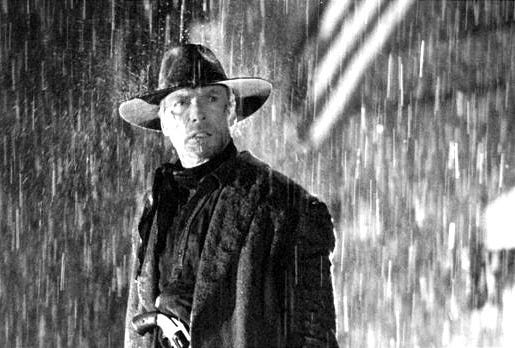At the end of Unforgiven, Clint Eastwood’s 1992 Oscar-winning western about frontier justice, William Munny, a fearsome former gunslinger, stands over a wounded and prostrate Little Bill Daggett, a sadistic sheriff who’d killed Munny’s friend as a public example and whose own end is now nigh.
As Munny gently levels his rifle at him in the dark, emptied saloon, a storm pounding in the background, Daggett declares, “I don’t deserve this. To die like this.”
Staring down the steel barrel, unmoved, Munny replies, “Deserve’s got nothin to do with it,” and squeezes the trigger.
When a would-be assassin’s high-powered bullet just-missed blowing Donald Trump’s head apart last summer like so many an innocent American schoolchild’s, the responsible reaction was one of relief that our poisonous politics had not succumbed to the ultimate violence — despite the death and violence that had already been spurred and promised by the candidate himself.
A similar reaction echoed when Brian Thompson, the CEO of UnitedHealthcare, was gunned down in New York City last week — a horrific sneak attack on an individual who had been rewarded handsomely to oversee death by denial.
In neither incident is the gunman’s motive known yet (and may never be), but the atmosphere in which each acted is well recognized. In Trump’s case, an entire political party, for the sake of their own ephemeral power, has foisted a man of surpassing disqualifications upon the body politic not once but twice, enabling the party’s billionaire benefactors to widen their wealth while doing lethal violence to the foundational principles of our shared nation. In Thompson’s case, similar moral violence has long been wrought by behemoth health insurance companies led by millionaire executives enjoying limited liability to deny all the coverage they can.
Neither man deserved to be shot. And neither initiated the conditions he exploited. But neither used his power to improve those conditions, either. Indeed, both upped the ante — Trump’s return to power portends less democracy, fewer rights, and more violence, not to mention less coverage for the hapless “insured,” which is in keeping with the carefully nurtured business model Thompson had long championed. (Never mind the public health imperative of reasonable gun restrictions.)
Which brings us to incentives — which is another word for choices. One begets another, though their self-justifications may vary widely and the full range of their potential consequences may never be fathomed. Trump’s choices stem from unalloyed self-interest unbeholden to truth, which is merely an instrument to be used or replaced depending on its situational utility. The embrace of Trump by Republican politicians reflects their collective recognition that the Party’s voters, the source of their power, believe in him, truthless though he be. So, if the choice is between power and truth, power it is.
Thompson’s choices likely stemmed from a corporate executive’s embrace of market dynamics as the proper arbiter of resource distribution; and if that means some people die (or permanently suffer, or are bankrupted, or . . .), then that ain’t me, it’s simply the system we have. Of course, having amassed in his work a reported personal fortune of $43 million, he didn’t need the health insurance he was safeguarding. (Again — the cold genius of market dynamics.)
Such was the atmosphere to which Trump and Thompson contributed, and in which their assailants arrived at their choices about two people they didn’t know personally and who, as individual human beings, didn’t deserve to be shot.
#TreatPeopleRight





